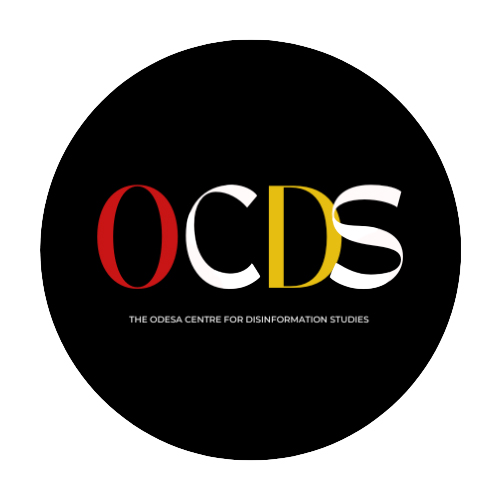The Odesa Centre for Disinformation Studies

The Odesa Centre for Disinformation Studies (OCDS) aims to promote in particular the study of Russian disinformation globally with a geographical focus on disinformation strategies in the Black Sea region. While there are many scholars working on Russian disinformation globally this Centre provides greater collaboration and coordination internationally as well as contributes to knowledge concerning disinformation practices in a specific region.
The OCDS, directed by Professor Dr Olga Brusylovska, is comprised a core of 8 researchers based at ONU:
- Dr Ganna Grabina (IR Department)
- Dr Iryna Maksymenko (IR Department)
- Dr Kateryna Vakarchuk (IR Department)
- Dr Maiia Nikolaeva (Department of Political Science)
- Yuliia Tarasiuk (Department of Social Communications and Regional Studies)
- PhD student Vera Nasikivska (IR Department)
- PhD student Denys Lishchynovskyi (IR Department)
The OCDS also involves associate institutional and individual associate members (academics and practitioners) based internationally. OCDS builds partnerships, enhances research capacity, provides support for research infrastructure, organises seminars and conferences, supports a network of scholars and practitioners, and seeds future research collaborations.
History
The creation of OCDS was a joint initiative between IR Department of the Odesa I. I. Mechnikov National University (Ukraine) and the Centre for Research in Communication and Culture (CRCC) at Loughborough University (UK).
Odesa I. I. Mechnikov National University and Loughborough University have collaborated on teaching and research activities since signing our twinning agreement in July 2022. There have been four well-attended guest lectures for ONU’s MA students in International Relations delivered by Loughborough faculty in the autumn of 2022. In December 2022 ONU and Loughborough jointly organised a research roundtable discussing the impact of Russia’s war on Ukraine on political communication, journalism, and public opinion in a global context (with the participation of a colleague from the University of Hyderabad, India). The research roundtable was supported by the Fund of the President of Ukraine. The results of the discussion are being prepared for publication in the Symposia section in the journal European Political Science. Funding has been obtained from the Institute for Advanced Studies at Loughborough to invite ONU academics Olga Brusylovska and Yuliia Tarasiuk to visit Loughborough for one week in April 2023 to deliver research symposia as well as engage in other capacity and partnership building activities. There are regular meeting between the senior management of both universities coordinated by Cormac Consultancy to extend cooperation in both teaching and research and in addition regular meetings at School and Departmental level to discuss collaboration in the field of international relations and political communication.
December 1, 2023, the OCDS and The Office of Cuba Broadcasting (OCB) embarked on a collaboration aimed at countering the pervasive influence of Russian disinformation, particularly in Spanish-language media. The OCB oversees Radio and Television Martí, its news website Martínoticias.com, and associated social media platforms. Headquartered in Miami, Florida, the Martís is a multimedia hub of unbiased and objective news, information, and analysis that provides the people of Cuba with interactive programs seven days a week through satellite television, shortwave and AM radio, and digital platforms. This partnership signifies a major step in addressing the dissemination of Russian propaganda echoed in the narrative of Cuba’s official press and foreign policy. Russian state-controlled media outlets, such as RT Actualidad and Sputnik Mundo, have been identified as primary sources of pro-Kremlin news content in Cuban media, often echoing Russia’s stance on the conflict in Ukraine. Our collaboration seeks to dissect these narratives to reduce their impact. By offering unique, well-informed perspectives, this partnership will equip audiences with the tools to effectively challenge and dismantle Russian disinformation. This new venture aligns with the strategic objectives of Ukrainian Information Security Strategy for the period until 2025 and the U.S. Agency for Global Media’s 2022-2026 Strategic Plan, which highlights the critical need to counter global disinformation (https://www.usagm.gov/2023/12/21/office-of-cuba-broadcasting-partners-with-odesa-center-for-disinformation-studies-to-counter-russian-propaganda/)




